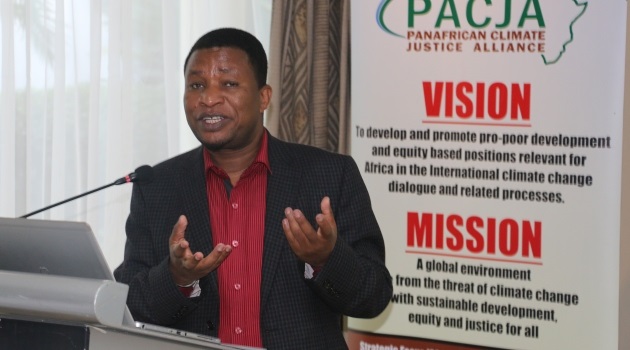Executive Director, Pan African Climate Justice Alliance (PACJA), Dr Mithika Mwenda, in a statement at the opening of the “Count Down to COP26” High-Level Meeting in Abuja on Monday, July 12, 2021, lists ways he feels the global dialogue leading to COP26 can deliver for Africa

In the spirit of Pan-African solidarity, we hope to hammer out collective strategies that reflect our shared needs, concerns, and desires ahead of COP26. The next few days are therefore going to be crucial as they may determine whether we choose to be complacent or to stand with the millions of Africans whom we represent from various sectors, and those at the frontline of climate crisis – and which has been exacerbated by the COVID-19 pandemic.
Africa has been, and will continue to be, the epicentre of the climate crisis in terms of the devastations wrecking communities. From cyclones which devasted Southern Africa and to drought in Horn of Africa; unpredictable rains to shifting seasons in various ecosystems across continent; flash floods to desertification; African communities already experience life-changing effects of climate change on agriculture, water resources, livestock production and even spirituality. Some of these effects are already irreversible.
Despite decades of strong declarations and promises, the international community has yet to fully respond to the unique needs and special circumstances of African countries. We are in the situation we find ourselves in even though we contribute insignificantly to global warming. Africans have neither benefitted as others from the fruits of earth-warming industrialisation; nor can they protect themselves from the effects of looming climate meltdown. For us, the climate crisis is a crisis of numerous injustices to the people of Africa.
The world has wasted too much time to squarely address the climate crisis. Every forecast shows that with the current levels of ambition to reduce greenhouse gases, we will exceed three degrees of warming this century. This is way off the two-degree (and 1.5 ambition) target of the Paris Agreement – at which, Africa is still expected to experience a dangerous level of warming.
Missed opportunities in the last year to address the climate crisis have increased the scale and urgency of action. As we are all aware, due to COVID-19 important meetings and opportunities for international dialogue on climate crisis were either delayed or cancelled.
Current attempts to catch up through virtual meetings – such as the just-concluded SB sessions – present new challenges that can further marginalise African concerns and voices. COP26 is therefore crucial, not only in advancing global climate action but in ensuring that they respond to the needs and aspirations of Africa people wherever they may find themselves. We have the opportunity in the next few days to demonstrate how that can be possible.
Let me share a few thoughts on how I think the global dialogue leading to COP26 can deliver for Africa.
Number one: Africa must be at the centre of negotiations. Parts of the continent are already warming at a rate that is twice the global average. Even if we met the targets of the Paris Agreement, Africa would suffer most from the so-called runaway climate change.
Therefore, issues related to adaptation and loss and damage, which have unfortunately been endlessly pushed to the margins, must be fully addressed. Equally, new long-term targets for climate finance must prioritise the implementation of NDCs in Africa.
Number two: Climate action must now be tailored to change the situation of poor communities. As COVID-19 has demonstrated, high concentrations of vulnerability amplify the negative effects of global crises and make them more expensive to address. The pandemic has triggered a public health and economic crisis on a scale unwitnessed in generations, and continues to exacerbate systemic socioeconomic weaknesses, thus:
- Unmasking deeply entrenched vulnerabilities, gaps and inequalities particularly in African countries, severely testing their social, economic, political and environmental resilience.
- Exerting a massive toll on the poor and most vulnerable, coincidentally people facing uncertain future as a result of the changing climate, jeopardizing decades of hard-won development gains.
- Widening, according to IMF, the continent’s financing gap to $345 billion.
- Derailing progress towards the achievement of the Agenda 2030.
- Placing many African countries in a vicious cycle in which liquidity challenges, reduced fiscal space and the cost of debt mean that they are unable to undertake many of the pressing counter-cyclical investment and stimulus measures that support a strong recovery.
Actions must therefore focus on building resilience in communities so that they are better prepared for what the climate throws at them and can respond better to future pandemics, as the COVID-19 is not the first nor the last one. That is why we are making locally-led, people-centred and community-driven actions the centre of our work going forward. In this light, it is our belief that low-carbon, climate-resilient, ecologically-just, fair and equitable ‘climate-positive’ actions must be at the centre of Post COVID-19 economic recovery plans not only in Africa, but globally.
Number three: Steps must be taken to increase the effective participation of Africa in climate decision and policy making, through healthy and safe in-person meetings. Current discussions about virtual negotiations fail to consider the unreliability of power supply, internet connectivity and access to technologies that will undermine the full participation of African countries and deprive the continent of opportunities to advance its interests.
We have already rejected this idea of virtual negotiations and are glad that it is position that is shared by the African Group of Negotiators.
